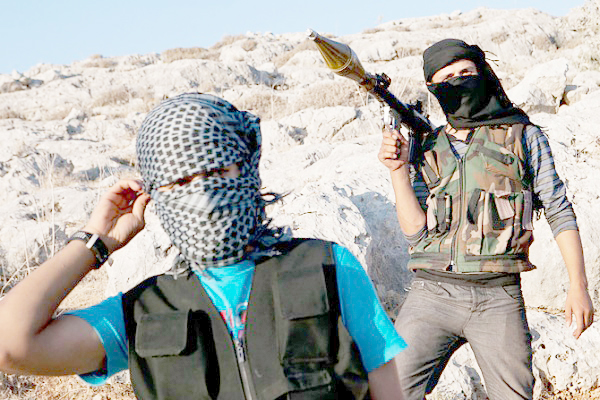BEIRUT: Syria’s Education Ministry has reversed a decision that banned teachers from wearing the niqab — the full Islamic veil that reveals only a woman’s eyes — and authorities closed the country’s only gambling center.
The move appears to be an attempt to please the Muslim majority in Syria as the regime faces pro-reform protests throughout the country that have left more than 80 people dead in three weeks.
State-run media reported the decisions to allow teachers wearing the niqab to return to work and to close Casino Damascus on Wednesday.
In July, Syrian authorities dismissed 1,200 female teachers wearing the niqab apparently to keep the country’s secular identity.
Muslims also were infuriated when Casino Damascus on New Year’s Day.
Meanwhile, the editor of a leading Syrian state-owned daily said on Tuesday that she was organizing talks with opposition figures so they can air their demands for reform, as deadly unrest entered its third week.
Unidentified "armed men" meanwhile killed two policemen in an eastern suburb of the capital Damascus, the state SANA news agency reported, as the International Federation for Human Rights (FIDH) said in Paris that 123 people had been killed in anti-government demonstrations up to April 1.
"Unidentified armed men killed two policemen on Tuesday afternoon in Kfar Batna, as they were conducting a patrol," SANA said without giving further details.
The editor of the Tishrin newspaper, Samira Al-Masalma, told AFP she was in touch with a number of well-known dissidents who have been jailed for their opinions in the past to try to start a dialogue.
"I have contacted certain intellectuals who are in disagreement with the regime, to organise a dialogue in which each of them can express their opinions on political reforms and civil liberties for the authorities to take into account," Masalma said.
She said she had already called two prominent writers, Fayez Sara and Louai Hussein, as well as philosopher Al-Tayeb Tizini, all three of whom have spent time in prison.
"They have accepted this initiative for dialogue," she said, adding that she hoped that Michel Kilo, one of the most well-known opposition figures, would also participate.
When contacted by AFP, Hussein said this "is an embryonic project to create lines of communication between those who are not in power and those who are close to it but are not decision makers," with a view to avoiding upheaval.
Mazen Darwish, director of the Syria Centre for Media and Freedom of Expression, said Masalma’s initiative had the "green light" from the authorities.
"In principle, the idea of a dialogue is a good thing, because it is precisely the lack of dialogue that has brought us to where we are today," Darwish said.
"It is useful because the street is well ahead of the political elites, and the authorities should hasten to respond to the demands of the street," he added.
President Bashar Al-Assad, who is facing the worst unrest in his 11 years in power, received representatives from the mainly Kurdish northeastern region of Hassakeh where protests erupted on Friday, the state news agency said.
"They discussed the demands of the inhabitants of this region," SANA reported, adding that the president had announced the formation of a commission to examine the plight of some 300,000 Kurds who have been denied Syrian citizenship for half a century.
Residents of the southern town of Daraa, one of the focal points of the protests which broke out on March 18, held a general strike.
"The general strike was largely observed," a human rights activist in the town told AFP by telephone, speaking on condition of anonymity.
The strike came a day after Assad appointed a new governor to the restive agricultural town.
The move was dismissed as not enough by Syrian human rights activists because "the residents of Daraa want more than a switch in governor."
The protest movement called for a boycott of cell phone companies on Wednesday, a rally against the ruling Baath party on Thursday outside its Damascus headquarters, and countrywide demonstrations on Friday.
In Paris, the International Federation for Human Rights (FIDH) published a list of the 123 people it said had been killed during anti-government protests between March 18 and April 1.
The list, drawn up by the Damascus Centre for Human Rights Studies, an FIDH member organization, also provided the date and location for many of the deaths.
Human rights activists say dozens of people have also been arrested. Seven who were detained last month have now been freed, lawyer Khalil Maatouk told AFP.

